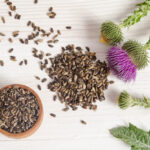Embrace milk thistle’s anticancer flavonoids
 (NaturalHealth365) Herbal healers have long treasured milk thistle – and its flavonoid compounds – for its ability to clean out the liver and reduce the risk of illnesses such as hepatitis, cirrhosis, and nonalcoholic fatty liver disease (NAFLD). But milk thistle may possess another valuable feather in its cap – recent studies support the ability of silymarin, a milk thistle constituent, to attack cancer in various ways while leaving normal cells unharmed. In fact, new research published in the International Journal Of Biological Macromolecules explores the potential of polyphenolic compounds, including silymarin, to reduce colorectal cancer tumor size in vivo.
(NaturalHealth365) Herbal healers have long treasured milk thistle – and its flavonoid compounds – for its ability to clean out the liver and reduce the risk of illnesses such as hepatitis, cirrhosis, and nonalcoholic fatty liver disease (NAFLD). But milk thistle may possess another valuable feather in its cap – recent studies support the ability of silymarin, a milk thistle constituent, to attack cancer in various ways while leaving normal cells unharmed. In fact, new research published in the International Journal Of Biological Macromolecules explores the potential of polyphenolic compounds, including silymarin, to reduce colorectal cancer tumor size in vivo.
Another study credits silymarin with the ability to attack cancer by interfering with a critical pathway the disease needs to spread. As if that weren’t impressive enough, research shows that silymarin from milk thistle can strengthen the therapeutic action of chemotherapy drugs while simultaneously easing their toxic side effects. Not that we “promote” the use of chemotherapy, but – it illustrates milk thistle’s fantastic ability to protect our health.
Silymarin inhibits the spread of stomach cancer cells
In a study conducted at Kongju National University and published in Oncology Reports, researchers found that silymarin significantly decreased the survival and migration of cancer cells – thereby interfering with the ability of the disease to spread to other locations in the body.
Silymarin also caused apoptosis – or programmed “cell suicide”- in stomach cancer cells. The team discovered that silymarin worked by interfering with the MAP-Kinase pathway, a chain of proteins involved in cancer cell growth.
Clearly, this is good news! The scientists noted silymarin’s potential for development as a cancer treatment and called for more study.
Silymarin fights cancer through multiple methods
Why, exactly, are researchers so impressed with silymarin’s therapeutic potential? For one thing, silymarin has powerful antioxidant and anti-inflammatory capabilities, allowing it to scavenge harmful free radicals and limit disease-causing oxidative damage.
In addition, silymarin protects and preserves glutathione, the “master antioxidant” and keystone of the body’s defense system. Silymarin also prevents toxins from binding to cell membrane receptors – thereby helping to protect against the cancer-causing mutation of cells.
Finally, silymarin decreases the production of matrix metalloproteinases (MMPs), enzymes that promote cancer metastasis. In research published in Carcinogenesis, scientists credited silymarin with suppressing the invasiveness of bone cancer by interfering with the production of MMPs.
In a separate study, researchers noted that silymarin prevented the progression of liver cancer, also by inhibiting MMPs.
Clinical and case studies highlight silymarin’s potential against hormone-sensitive cancers
Silymarin shows particular promise in preventing and treating cancers that depend on hormones to grow, such as cancers of the breast and prostate.
The flavonoid has been shown to block migration in breast cancer cells – even those of triple-negative breast cancer, which is particularly invasive. Silymarin also decreases levels of telomerase, which promotes breast cancer cell survival.
In a promising study published in Cancer Research, 160 mg of silymarin a day reduced the size of prostate cancer tumors by up to 64 percent. Silymarin can also help prevent prostate cancer by boosting levels of proteins that destroy potentially pre-cancerous cells and suppressing the production of inflammatory molecules linked to prostate cancer spread.
In one study, a protocol of silymarin with vitamins C and E, along with the cancer-fighting mineral selenium, significantly reduced markers of cancer in prostate cancer patients.
Milk thistle extracts increase the power of conventional cancer drugs while alleviating toxic effects
In addition to its other gifts, silymarin can help diminish the adverse effects of anticancer drugs. In one randomized, placebo-controlled study involving children with acute lymphoblastic leukemia, 160 to 320 mg a day of silymarin for 28 days reduced liver toxicity from chemotherapy.
The flavonoid also helped to restore liver function in breast cancer patients treated with the chemodrug carboplatin. As if that weren’t impressive enough, silymarin also seems to promote and intensify the cancer-fighting properties of other medications and therapies.
In one study, silibinin (a type of silymarin) made brain cancer cells more susceptible to trial cancer treatments. Other studies have demonstrated silymarin’s ability to increase the effectiveness of photodynamic theory on bladder cancer cells.
Non-toxic milk thistle features an excellent safety profile
Milk thistle is available in tablets, capsules, and powders – and can even be sipped as a tea. Holistic healthcare providers may advise 100 mg to 450 mg a day – with about 150 mg advised for general liver support.
Note: It’s best to consult with a doctor who has experience with herbs before trying milk thistle. Don’t attempt to treat cancer or any other medical condition with milk thistle extract unless under the supervision of a medical professional.
Editor’s note: Discover the many ways to naturally stop cancer cell growth, own the Stop Cancer Docu-Class created by NaturalHealth365 Programs.
Sources for this article include:



